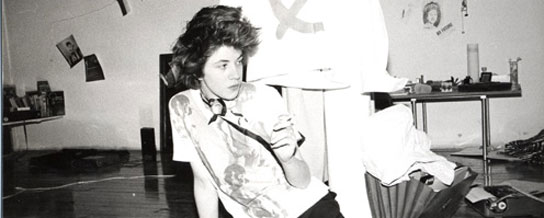TBC: Songs in the Key of ZE
pictured Lizzy Mercier Descloux Representing everything that was cool about funk, punk, and mutant disco […]

TBC: Songs in the Key of ZE
pictured Lizzy Mercier Descloux Representing everything that was cool about funk, punk, and mutant disco […]

pictured Lizzy Mercier Descloux
Representing everything that was cool about funk, punk, and mutant disco in New York City in the early-to-mid-’80s, famed cult banner ZE Records began in 1978 when Michael Zilkha struck up a friendship with Michel Esteban after meeting through mutual pal John Cale. While their partnership was an unlikely pairing—Zilkha being an Oxford grad and heir to the Mothercare throne; Esteban, a French-born publisher and proprietor of Rock News magazine and the Harry Cover punk shop—the two shared an affection for the Velvet Underground, fashion, and Neo-Expressionist art. Tapping into the underground noise and disco scenes of NYC, the label went on to release a string of successful records by James White & The Blacks, Was (Not Was), Suicide, and Esteban’s former lover Lizzy Mercier Descloux before adjourning for a 16-year dormancy in 1986. ZE, which recently celebrated its 30th birthday, was reactivated in 2002. We checked in with Esteban to talk about ZE’s history and its influence on music today.
XLR8R: How has your job changed at ZE Records from the ’70s to now?
Michel Esteban: Fortunately, my job today isn’t just running a record label, ’cause I could not survive. In the last four years, I faced the bankruptcy of three of my distributors. Today music is everywhere—kids can get anything for free. In my youth, if you had a budget [to buy] four albums a month, that was paradise. So, in a way, it is great for the music but dramatic for artists and producers until we find a viable economic model. But 10 years ago, all the decisions taken by the majors in that department were disastrous for the artists and the indie labels.
Why did you decide to relaunch ZE?
When I realized that most of the [DFA and Output] bands were very influenced by the music that we produced 30 years ago. And when I met James Murphy and Trevor Jackson they both told me that they were big fans of ZE. It is always pleasant to see that with your work, you have influenced talented people. It was the right time to re-release our entire back catalog, which was unavailable for years, and most of the records were never released on CD. I also released the debut album of Emily McLaren under the name of her band Michael Dracula.
Why did ZE close up shop in the first place in the 1980s?
A strategical difference of view with Michael Zilkha, especially around the delicate subject of his wife Cristina. Not that I did not like her or her albums. She was/is a brilliant girl, but as far I was concerned, they had a sick relationship, which was interfering with the label. In terms of business, Michael had Daddy’s money to spend; for me, it was my money. Also, I thought that by 1982, the golden years of NY—creatively speaking—were fading, and I wanted to travel more. That’s what I did by producing Lizzy Mercier Descloux’s next two albums in South Africa and Brazil.
Tell me about your partnership with Michael Zilkha.
I met Michael when I was working with John Cale. [He] was working as a theater critic for the Village Voice and had his father’s money to invest in the music business. Michael was very shy, and had no experience in the music business, but was very passionate… When I left ZE, Michael continued for a couple of years, lost interest, divorced Cristina, left New York to move to Texas, and went into the oil business with his father. When I relaunched ZE in 2003, we met in NY. He did not want go back in the music business, but he helped me to relaunch ZE.
What changed for ZE once Island Records started distributing your music?
Island (through Chris Blackwell, for whom I had a lot of respect) was only our distributor in Europe and Japan. We also could use Compass Point Studio in Nassau, Bahamas, which was a great studio and fun to do records with Grace Jones or Bob Marley in the room next door! We became a very fashionable cult label with the English press. The Face called us “the most fashionable record label in the world,” and John Peel “the best indie label in the world.” So that was cool! Island was a great independent label; not a major.
Was there anyone from back then that you wanted to sign to the label but never got the chance to?
Yes. B-52’s and Devo.
The term “mutant disco” is thrown around a lot in reference to ZE. What is your take on it?
I believe we were the first to use that term on our 1980 [compilation] release. Definitely Was (Not Was)’s “Wheel Me Out” was a perfect example of mutant disco for me, the perfect bridge between MC5 and Funkadelic with witty lyrics. The faux frères [“false brothers”] Was were two talented Detroit freaks nourished by Motown music on one side and the MC5, Iggy and The Stooges, and Mitch Rider on the other. I mean, where in 1979 could you find a band featuring Wayne Kramer on guitar, Charlie Mingus’ former trumpeters Marcus Belgrave and Sir Harry Bowens, Parliament/Funkadelic’s flamboyant percussionist Larry Fratangelo, and house pioneer Ken Collier behind the desk?

